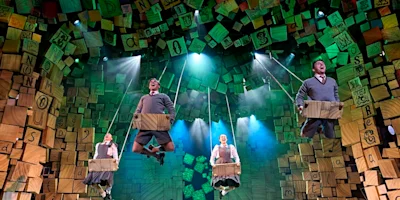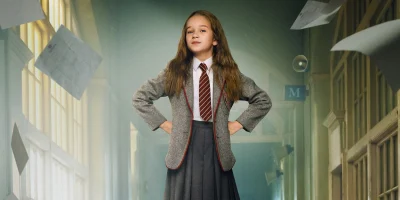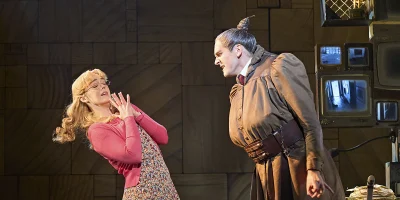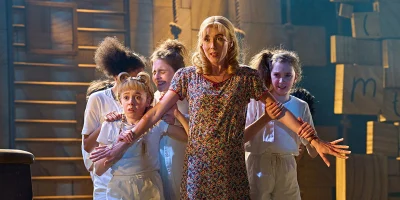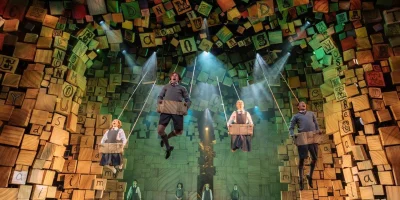
A guide to all the songs in 'Matilda the Musical'
Learn more about Tim Minchin's irrepressible songs from Matilda the Musical, including "Miracle," "Naughty," "When I Grow Up," and "Revolting Children."
A bona fide modern classic, Matilda has been playing in the West End since 2011. It’s hard to believe that this Royal Shakespeare Company masterpiece was originally commissioned for only a Christmas run in Stratford upon Avon in 2010. The story of the young girl with preternatural intellect and telekinetic powers has captivated audiences for over a decade. Unlike Bruce Bogtrotter and his chocolate cake, audiences show no sign of having had their fill.
Based on Roald Dahl’s 1988 children’s classic, the show features music and lyrics by comedian, actor, musician, and songwriter Tim Minchin (Groundhog Day) and a book by Dennis Kelly (Utopia, Pulling). The production is directed by Matthew Warchus. Among its wins in the 2012 Olivier Awards were Best New Musical, Best Director, Best Theatre Choreography, and Best Set Design. The Netflix film version directed by Warchus was released in 2021.
You can listen to the original RSC cast album with Bertie Carvel as Miss Trunchbull, Lauren Ward as Miss Honey, Paul Kaye and Josie Walker as Mr and Mrs Wormwood, and Adrianna Bertola, Josie Griffiths, and Kerry Ingram as Matilda. There is also a Broadway cast recording, also starring Carvel and Ward, with American actors in the other roles.
Learn more about the wonderful songs here – they really are a miracle!
Book Matilda The Musical tickets on London Theatre.

“Miracle”
A hilarious yet heartbreaking ensemble number that immediately captures Dahl’s satirical spirit. All parents think their children are wonderful, right? A miracle, a brave little soldier, an angel sent from above... And said children don’t lack self-esteem. A doctor is sceptical about these miracle children – they can’t all really be so wonderful, can they? But there’s one expectant mother who isn’t so keen to meet her bundle of joy – she doesn’t even know she’s expecting and only cares about getting to her ballroom dancing competition. The doctor sings about the miracle of new life but Mrs Wormwood is unmoved. Her husband is disappointed the baby isn’t a boy. It isn’t much of a start for our young heroine, whose parents call her “a lousy little worm” and “a good case for population control.”
“Naughty”
Matilda is learning about personal agency through fictional characters: Jack and Jill, Romeo and Juliet, Cinderella. Were the outcomes inevitable? Not really: “Just because you find that life's not fair, it doesn't mean that you just have to grin and bear it / If you always take it on the chin and wear it / Nothing will change.” This wonderful number establishes Matilda’s character: she’s a young lady who is formidably bright, believes strongly in justice, and won’t be anyone’s fool. She’s the only one who can change her story – and she won’t be able to do that by playing nice with her parents. She adds her mother’s peroxide to her father’s hair dye, giving him green hair.
“School Song”
Matilda is starting school. Crunchem Hall is a forbidding place where no one is special and the pampered princes and princesses we met earlier are about to have a rude awakening. As the big kids explain, the only way to survive is to conform as life is even more miserable if you step out of line. Childhood innocence is over. Just you wait for phys-ed!
Take a look at the lyrics carefully – can you see how they spell out the alphabet?
“Pathetic”
Matilda’s talents are immediately apparent to her lovely teacher Miss Honey. She knows that Matilda needs to be moved to the top form but making the request involves confronting terrifying headmistress Miss Trunchbull. She tries to put it off but gathers her strength.
“The Hammer”
Miss Trunchbull is a former hammer-throwing champion and she proudly shows off her trophies. Discipline is what has made her what she is. If the children under her charge want to have the same kind of success, “You don't need happiness or self-esteem / You just need to keep your feet inside the line.”
“The Chokey Chant”
The children tell Matilda about the Chokey, a cupboard lined with nails where Miss Trunchbull imprisons disobedient pupils. This number only appears on the Broadway cast album.
“Loud”
Mrs Wormwood mocks Matilda’s intellectual and bookish personality. To get noticed, you have to be loud and flashy. With her dance partner Rudolpho, she advises her daughter, “You've got a light, don't hide it under a bushel!” After all, “The less you have to sell, the harder you sell it! / The less you have to say, the louder you yell it!”
“This Little Girl”
Miss Honey is struggling with her self-esteem but she resolves not to let Matilda slip through the net and vows to advocate for her.
“Bruce”
Oh no! Bruce Bogtrotter has been caught stealing Miss Trunchbull’s chocolate cake. His punishment is to eat a whole cake singlehandedly. How can he do it without being sick? The children cheer him on. A big chocolatey burp erupts. Miss Trunchbull is not amused by any of this.
“Telly”
A country-inspired number in which Mr Wormwood boasts that everything he’s ever learned, he’s learned from telly (“the bigger the telly the smarter the man”). Why bother with books? This always gets a reaction from the crowd!
“When I Grow Up”
Tissues at the ready. The children sing about their hopes and dreams for the future. They’ll eat sweets every day, stay up late, and watch cartoons whenever they want. They’ll also be “smart enough to answer all / The questions that you need to know / The answers to, before you're grown up.” Miss Honey's life doesn’t feel entirely grown up herself. The combination of the emotions the song evokes (for children and so-called grown-ups) and the unforgettable staging on the swings makes the number a true modern classic of musical theatre.
“I’m Here”
Matilda continues the story of the Little Girl and the Escapologist. The Escapologist discovers that his daughter is being beaten by her cruel aunt. They comfort each other. He sets out to confront the aunt, but he never comes home again.
“The Smell of Rebellion”
Miss Trunchbull is disturbed by the “bouquet of dissent” that’s permeating the school and leads a particularly gruelling phys-ed class to break the rebels’ spirits (“Before the worm starts to turn / You must scrape off the dirt / And rip it from the mud!”). This wordy number with patter passages also pays homage to John Lennon’s “Imagine” as the Trunchbull dreams about a world with no children.
“Quiet”
Matilda discovers her telekinetic skills. She’s always known she’s a bit different to her friends: “These answers that come into my mind unbidden / These stories delivered to me fully written / And when everyone shouts they seem to like shouting / The noise in my head is incredibly loud.” She longs for quiet, “like silence but not really silent / Just that still sort of quiet like a page being turned in a book.”
Tim Minchin struggled to write music for Matilda herself and found “Quiet” the hardest number to write. He considered making her a non-singing character in the middle of a musical world but (fortunately) concluded that, in a musical, the main character needs to sing! He knew that a showy “11 o’clock number” wouldn’t suit the character, so he wrote this understated counterpoint to “Loud.”
“My House”
It’s been quite a day. Miss Honey takes Matilda home for tea. Her converted farm shed has a table that’s perfect for tea; the walls are decorated with wonderful pictures, and she watches the seasons change through the window: “It isn’t much but it is enough for me.” Miss Honey tells Matilda that after her parents died, she was raised by an abusive aunt. Matilda realises that the Little Girl and the Acrobat and Escapologist from her story are Miss Honey and her parents – and the aunt is Miss Trunchbull!
“Chalk Writing”
Matilda uses her powers to write on the blackboard, pretending to be the ghost of Miss Honey’s father. Miss Trunchbull panics and takes flight.
This number is not on either cast album.
“Revolting Children”
The 11 o’clock number is a disco-rock ensemble number for the kids, who are newly liberated from the Trunchbull’s reign of terror. They reclaim the label their deposed headmistress gave them and turn into a battle cry: "We are revolting children / Living in revolting times / We sing revolting songs / Using revolting rhymes / We'll be revolting children / Til our revolting's done." Revolting can mean “disgusting” or “revolutionary” and this barn-storming number shows that these kids will be as revolting as they need to be until justice is achieved.
“When I Grow Up” (Reprise) / “Naughty” (Reprise)
Miss Honey receives her rightful inheritance from her parents and becomes the new headmistress. Everyone is delighted. The Wormwoods’ dealings with the Russian mafia catch up with them and they plan to flee the country. Matilda’s intellect impresses their aggressor, Sergei, with her intellect, and he lets them go. The parents leave for Spain and Matilda is allowed to live with Miss Honey, forming a new family. The company celebrates.
Other songs from Matilda
Matilda begins telling the story of the Acrobat and the Escapologist to kindly librarian Mrs Phelps early in the show. Only the fourth part of the story appears on the RSC cast album but the first three parts can be heard as bonus tracks on the Broadway cast album. The Broadway cast album also features “Perhaps a Child” sung by Sergei, which was cut in Stratford due to the length of the show, and all four original Matildas singing a special version of “Naughty”. The film cut several numbers and added a new finale, “You’re Still Holding My Hand.”
Book now to hear all the songs live, plus the fabulous staging and unforgettable performances.
Book Matilda the Musical tickets on London Theatre
Photo credit: Matilda the Musical. (Photo courtesy of production)
Frequently asked questions
What is Matilda The Musical about?
Sometimes you have to be a little bit naughty! Based on the classic novel, this global smash is all about the power of stories– and a little bit of misbehaviour. Winning awards around the world, the West End production is the original version of this innovative and heartwarming musical. Take your turn at Matilda the Musical at the Cambridge Theatre today.
How long is Matilda The Musical?
The running time of Matilda The Musical is 2hr 35min. Incl. 1 Intermission.
Where is Matilda The Musical playing?
Matilda The Musical is playing at Cambridge Theatre. The theatre is located at Seven Dials, 32-34 Earlham Street, London, WC2H 9HU.
What's the age requirement for Matilda The Musical?
The recommended age for Matilda The Musical is Ages 6+. No children under the age of 4 will be admitted and every customer must have their own ticket. Under 16s must be sat with an adult. To make sure everyone enjoys the show, little ones need to be able to sit in their own seat without any assistance..
How do you book tickets for Matilda The Musical?
Book tickets for Matilda The Musical on London Theatre.
What are the songs in 'Matilda'?
Matilda features a score including catchy tunes like “Naughty,” “Revolting Children,” and “Bruce.” Read more about the songs in Matilda in our ultimate guide to the show here.
Who wrote 'Matilda'?
Tim Minchin wrote the music and lyrics to Matilda, working alongside playwright Dennis Kelly. Adapted from Roald Dahl’s novel of the same name, the musical tells the story of a young girl with extraordinary abilities.
Who directed 'Matilda'?
Matthew Warchus directed Matilda the Musical on stage and won the Olivier Award for Best Direction in 2012.
When did 'Matilda' open in the West End?
Matilda the Musical opened in London's West End on November 24, 2011, at the Cambridge Theatre.
Is 'Matilda' appropriate for kids?
Those of all ages can enjoy Matilda, but the show is most suitable for those above the age of 6.
Is 'Matilda' good?
The musical adaptation of Matilda is an enjoyable family trip to the theatre. This exciting adaptation of the much-loved Roald Dahl novel is a must-see. Read our five-star review of Matilda.
Originally published on



